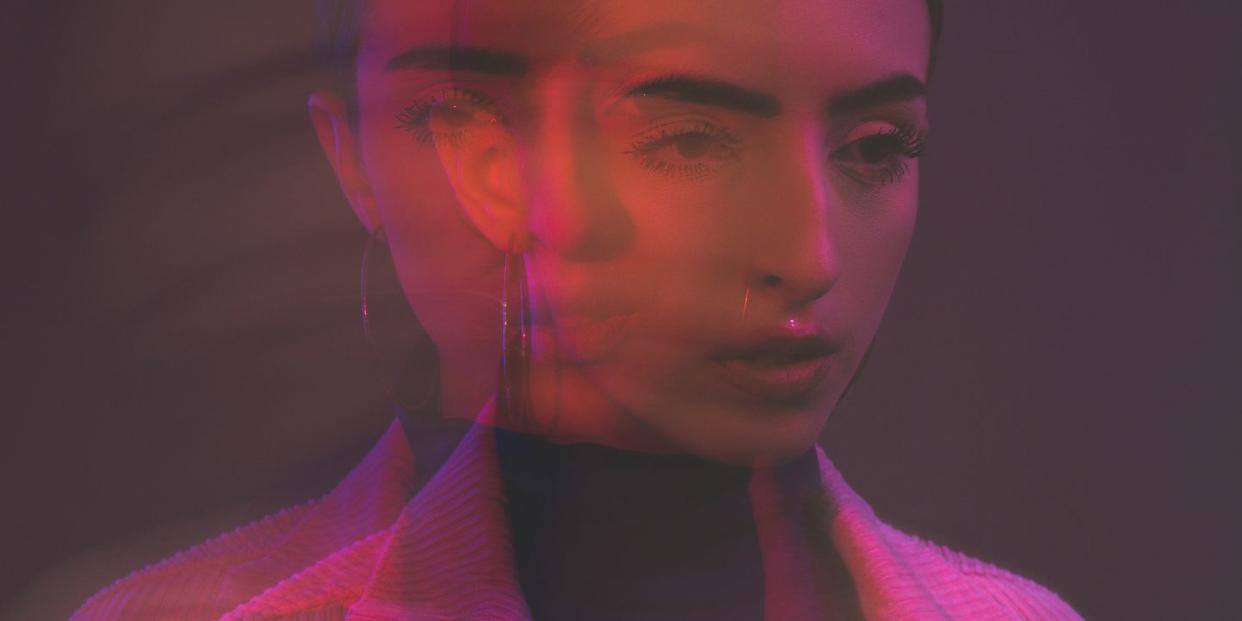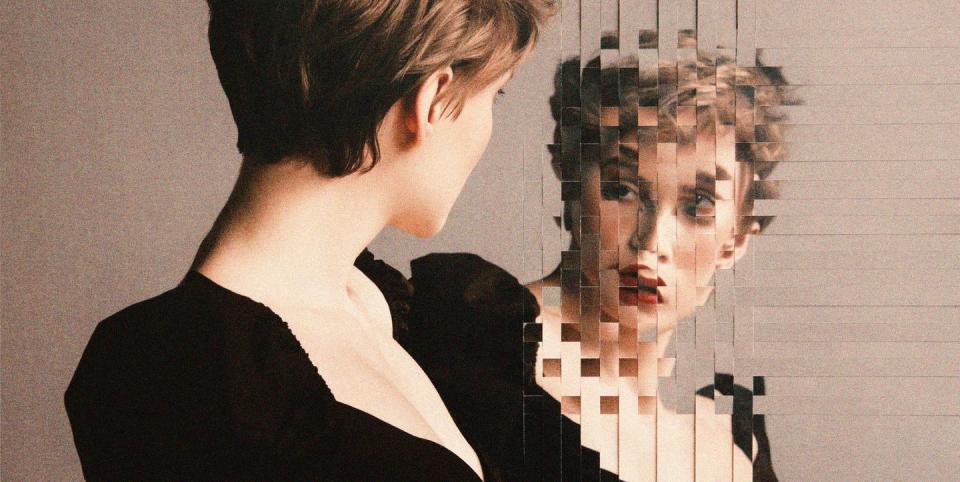'I thought I looked pretty – until I realised my friend had Photoshopped me’

It was a typical Sunday. Hungover in bed, I scrolled through the many pictures my friends and I had taken the night before. We’d been out celebrating a birthday in a bougie cocktail bar, and it was one of those evenings where the morning after found me with sore feet but a full heart – grateful for female friendships.
Looking back at my Instagram Story, I held the screen to pause on one of the photos that I’d reposted, keen to relive some of the joy. But in the light of day something wasn’t sitting right. Something didn’t look right either.
The image, of myself and Chloe*, sat on bar stools, doe-eyed with wide grins, had been a favourite when I’d initially re-shared it. I’d been both surprised and delighted that for once I had a decent picture of myself from a night out. Until I realised Chloe had Photoshopped my appearance in it.
The changes were so subtle that at first, I’d not spotted them. But looking again (minus the buzz of an espresso martini), I saw my skin was glass-like, without a pore in sight. In reality, dark circles still peaked through my concealer and no amount of setting power could make my forehead look matte.
I took a screenshot so that I could inspect the image more closely, zoomed in, then brought the phone closer to my eyes. The sweat from my forehead and upper lip had also vanished. My jawline was chiselled, cheekbones more defined. My upper arm smooth, the veins that usually peak through my pale skin nowhere to be found.
My so-called ‘imperfections’ had been deftly erased – without my knowledge or consent – and in their place, I was left with a barrage of emotions: sadness, confusion and a whole heap of new insecurities. It brought back feelings of inadequacy from eleven years ago, when I was 16 years old. Obsessed with having a thigh-gap, having consumed image after image of waif-like Tumblr models, and with trying to fit into a size 6, instead of just buying a pair of jeans that actually fit me.
Despite Chloe having a glossy grid that could rival any influencer, as someone who’s only ever used the photography app VSCO for a retro effect, or added a bit of grain to my photos, I’d never considered that she might be making full-on face edits.
Another thought resounded: was I not worthy enough in my natural form – did Chloe think my appearance was bringing her social media presence down? How did we ever reach a point where face-tuning is so commonplace that even our friends don’t think twice before airbrushing us?
Our descent into airbrushing
It’s certainly not just Chloe. Our slippery descent into Photoshop normalisation began with celebs (see:the many Kardashian-Jenner slip-ups we’ve witnessed over the last decade), then as the technology became ever-more accessible, it trickled down to influencers, many of whom deployed no make-up filters so subtle they were barely perceptible – until the filter glitched and became a news story in itself. All this fed into the wider narrative of the already unattainable beauty standards levelled at women. Now, they are so unattainable they literally don’t even exist for those who perpetuate them in many cases. It seems we’re all so desensitised to falsified images and videos from public figures that editing ourselves has become an ‘everyday’ non-public facing persona thing, too.
But how harmful are these unreachable standards? Could it be that by altering ourselves to look ‘prettier’, slimmer, curvier, we might all end up looking the same? I find it’s getting harder and harder to remember what unedited faces and bodies look like; there’s even been a rise in people showing filtered images of themselves while booking in for plastic surgery, hoping to replicate their edits IRL.
Simultaneously, in an effort to undo the damage, TikTok videos showing what a ‘real 30 year-old looks like’ are trending and over on Instagram, I’m grateful to the handful of influencers, like Danae Mercer and Bree Lenehan, who post ‘before and after’ pictures, showing their bodies posed but also relaxed. I appreciate them even more so when the algorithm decides to serve me up a ‘best skincare products to smooth your lines’ immediately after. I’m only 27.
About three months passed before I decided to confront Chloe over the editing. I didn’t want to sound whiny and I was afraid to hurt her feelings, but we often go out together... and I also didn’t want her to alter my face again.
I asked Chloe to meet for coffee and kept things vague in my message, simply saying it would be good to chat. Along with cups of cappuccinos and two slices of pie, we sat outside in the sun. I waited until the tables around us were empty as I didn’t want anyone to overhear and anxiously stumbled over my words as I tried to find the best way to bring it up. “I hope you won’t take this the wrong way,” I started. “I promise I’m not angry, but I noticed you’d edited our photos a while back. I just wanted to ask why that was?”
Chloe looked surprised. She took a beat, then explained how yes, she’d blurred our faces. She then detailed the exact app that she’d used , one that a friend told her about, and all the ways you can alter your appearance on it. I was almost impressed.

“Editing both of us made it look more natural,” she pointed out. She had never, ever wanted me to feel bad. “But if I’d only edited me,” Chloe said, “It would be more obvious.” She hadn’t thought much of it at the time, she added, given she does it so routinely.
For Chloe, it had started by editing a strand of hair off her forehead. Quickly, she’d then realised exactly how much she could do, like change the shape of her face, and how she too could make her pictures look like the ones we see of others online. The ones that bring home hundreds or thousands of likes. Seeing her feed of influencers, some of whom we personally know, made Chloe feel she had to “up her game”.
As coffee machines hissed in the background and baristas called out names for orders, we took it in turns confessing to one other about our bodies and insecurities. It was a warm day, and we admitted how wearing shorts made us feel overly conscious of the cellulite on the back of our legs.
In a way, it was comforting to have that shared moment. But it also made me feel incredibly sad that we both felt the need to alter ourselves to fit a mould of unrealistic standards; be it through changing our outfits to ‘hide’ something natural like cellulite, or through Photoshopping photos of a night out (friends included).
It marked a turning point for me: I vowed to myself to always post the damn picture, the one I would usually have deleted before. The type Chloe would likely still edit. The ones showing zits and a sweaty forehead – the sign of a good night out. I don’t want to contribute to another person’s insecurities. After all, if you bumped into me on the street or in said bougie cocktail bar, that’s how you would meet me. Free of a filter.
*Name has been changed
You Might Also Like

 Yahoo News
Yahoo News 
